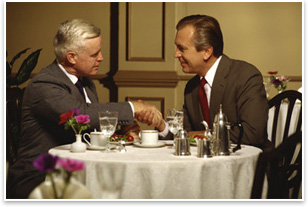
Best Practices Summary: Time commitment to marketing and business development has grown faster than any other task area for firm principals and partners in recent years, according to the latest Work on the Boards survey. To spread that non-billable burden among everybody in the firm who might have contact with potential clients, a few tips are in order on what to do and say in social settings and other casual encounters.
Do prepare. Successful small talk is very important to creating a comfortable mood, so it shouldn’t be left to happenstance. Most people like to talk about themselves, but not always. Do some research into the person’s family and accomplishments as well as outside interests. It may sound strange, but it usually helps to plan for spontaneity.
Prepare. If you have a goal statement that focuses on what you do well, take it and turn it around so that you define specific talking points on the value your clients derive from working with you rather than your competitors. Craft those into “elevator conversations”—concepts (not scripts) that can be worked into a 20-second, spur-of-the-moment encounter. Practice. Make this into a game, if you will. Set up hypothetical situations—a chance meeting in a lobby or a conversation while waiting for a table—and devote a staff meeting to having people role play the potential client and the firm representative. Watch and talk about what happened, why, and how it might be improved. Measure. Have a mechanism for people to report on planned or chance encounters with clients or potential clients. What messages were delivered? Were there reactions—positive, neutral, or negative? What was the follow-up? Were there results? Are there opportunities for improvement? Refine. Include reports and results from your branding efforts in every principal-level marketing meeting. Pass back all noteworthy deliberations and conclusions to everybody in the firm, along with the message that you are always open to ideas.
|
||
Copyright 2006 The American Institute of Architects. All rights reserved. Home Page |
||
news headlines
practice
business
design
recent related
› Firm Marketing from the Client Perspective
› Assessing the Residential Remodeling Market
› Types of Firms (and Who Might Be Looking to Work There)
For more about the Zweigletter, visit the ZweigWhite Web site.

 Management consultant ZweigWhite in its September 18
Management consultant ZweigWhite in its September 18  Remember the brand
Remember the brand